
Image of School of Biotechnology
The special Centre of Biotechnology was established in the year 1985 under joint sponsorship of the UGC and the Department of Biotechnology, Government of India. Realizing the importance of availability of trained manpower in the area of Biotechnology in the country a Master of Science programme in Biotechnology was started at the Centre in JNU in the same year with funding from the Department of Biotechnology, Government of India.
This programme aimed at generating skilled manpower in different areas of biotechnology which would not only feed the Biotechnology related industries but also would provide trained and motivated persons required by other institutions. With a modest beginning of two faculty members and eleven students in the year 1985-86 the Centre now has 8 faculty members and two research associates to help in the teaching programme and 35 students in the Masters programme. Over the years the Centre has established a very successful M.Sc. programme which selects the best of the students from the merit list prepared on the basis of an All India Entrance Test conducted by JNU.
Analysis of the merit list indicates that during the past five years about 50-60 percent of the students from the top hundred give their first preference to JNU for admission. But only 20- 25 students are taken every year from the top on the basis of their preference.Till now most of the M.Sc. students have gone to do research in different institutions in the country and abroad and few have taken up jobs in different industries and other institutions. One of the strongest points of the M. Sc.programme is emphasis on teaching of technological aspects of modem biology. Our M.Sc. students undertake a project work over a period of two semesters (6 months) with one of the faculty members during which time they are exposed to actual research work. This helps them tremendously in building up their confidence and understanding of Biotechnology.
The Centre started a Ph.D. programme in Biotechnology in the year 1987. Under this programme there are now 40 students selected through entrance examination and interview, 4 selected directly by interview and two students are foreign nationals. Four Ph.D. students have completed their viva voce examination for Ph.D. during the period I st April 1997 to 3 1 st March 1998. 20 students have been awarded M. Sc. degree in July 1997.
THRUST AREAS AND PERSPECTIVE PLANS
The thrust areas in which the faculty members of the Cenre for Biotechnology are conducting their research are:-
1. Protein Engineering
2. Eukaryotic gene expression
3. Molecular biology of infectious diseases
4. Immunology
5. Protein stability, conformation and folding
6. Over-expression of recombinant proteins
7. Transcription of eukaryotic genes
8. Gene expression and regulation in mammalian systems
Although interdisciplinary theoretical teaching is imparted at M. Sc. level, providing adequate hands on training to the students has not been possible yet largely due to lack of appropriate infrastructure and availability of teachers with expertise in different disciplines of Biotechnology. It is realized that creating a real impact on the development of Biotechnology in the country, which can help in providing better living conditions to people, will not be possible bly training students at M.Sc. level only. Problem solving and knowledge generating multidisciplinary projects can be taken up only at post M.Sc. level. It requires a high component of research and its application for which Ph.D. or M. Tech. training is required.
The Ph.D. programme is mostly supported by the grants generated by our faculty and money given by the University. But due to lack of adequate infrastructure it is confined to mostly basic research or at the best peripherally applied research. This can not continue any longer.
Some of the fastest growing areas in Biotechnology are Recombinant DNA technology, Microbial biotechnology, tissue culture technology and cell biology, Immuno technology and Protein engineering.
It is strongly felt that for fulfilling the mandate i.e. imparting real interdisciplinary training in Biotechnology with a problem solving approach, a post M.Sc. research based M.Tech. programme of one Ana half year duration ought to be started. Industrial and applied biotechnology problems related to health care delivery e.g. development of diagnostic kits etc., production of recombinant proteins, their purification and stabilization, generation and propagation of strains expressing intermediate metabolites and creation oftransgenic animals and plants, which will need a thorough interdisciplinary facility will be addressed.
Each research project will be guided and monitored by a team of well qualified faculty. Such a programme will attract a lot of interest from industry and candidates sponsored by industry can be trained. If adequate infrastructuref or such purposes is built up, these facilities can be rented to industry to solve their problems. By this way proper University industry interaction which is an essential component for development of real biotechnology in the country will be ushered in. This will also generate revenue and help immensely in placement of students in the industry.